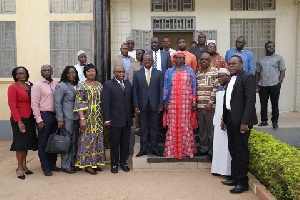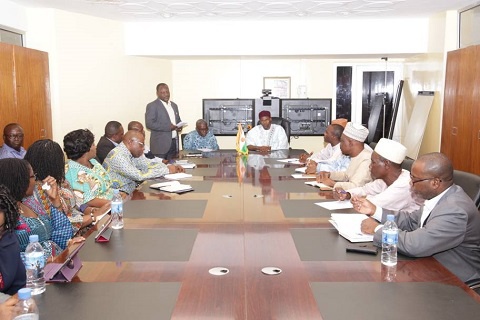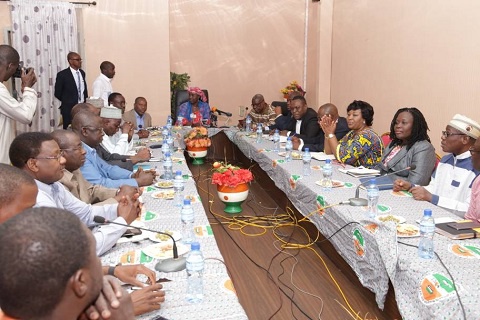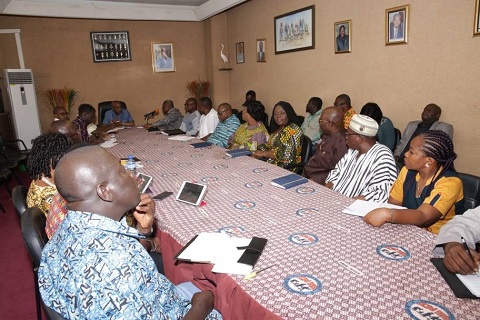 The Ghanaian delegation was assured of the support of the business community in Niger
The Ghanaian delegation was assured of the support of the business community in Niger
Economic Operators, as well as relevant government ministries and agencies responsible for trade in the West African nation of Niger, is calling on Ghana’s Port Authority and key trade facilitators to position the Ghanaian corridor to attract more traffic from Niger in view of unfair trade practices implemented on competing francophone corridors used by economic operators from Niger.
Niger and the two other neighbours, Mali and Burkina Faso are the three main Land Locked Countries (LLC) in the West Africa sub-region who are traditionally aligned in using the seaports of fellow Francophone countries in Dakar, Guinea, Abidjan, Lome and Cotonou to participate in international trade.
However, due to inefficiencies, high cost of operations, poor transportation networks, delays and political instability in these countries, economic operators in the LLC’s have realized the need to diversify their use of seaports in the sub-region to impact positively in the lives of their citizenry.
Transit traffic through the two ports of Ghana has over the last 4 years have steadily been recording annual growth from 609,320 metric tonnes in 2014 to 1,249,336 metric tonnes in 2017 representing an increase of 105%.
Despite this positive trend, Niger’s traffic through the two Ghanaian ports has taken the opposite direction with trade decreasing from 50,224 metric tonnes to 18,195 metric tonnes in 2017 representing a decrease of 64% within the same period.
It appears the opportunities that abound on the Ghanaian corridor and its seaports is fast receiving acknowledgement throughout the Sahelian Region as economic operators and governmental institutions request Ghana to avail itself to capture the Nigerian transit Market.

During a Ghana Ports and Harbours Authority initiated 5 days Trade Mission to Niamey, the capital of Niger, a team of delegates led by the Board Chairman of Ghana Ports and Harbours Authority, Mr. Peter Mac Manu and supported by the Director General of GPHA, Mr. Paul Asare Ansah, assured the Government and Economic Operators of Niger that Ghana has prepared itself to offer every assistance needed to allow commercially viable and cost effective importation and exportation by the people of Niger through Ghana’s Ports and corridors.
The Delegation which also included, a Deputy Commissioner of Customs Division of the Ghana Revenue Authority, Alhaji Abubakar Seidu, Representatives of Ghana Shippers Authority, Ghana Police Service, Ghana Chamber of Commerce, Directors of Port Terminals and Management of Ghana Ports and Harbours Authority including Mrs. Esther Gyebi-Donkor, General Manager of Marketing Corporate Affairs and David Songotu, GPHA’s representative to the Sahelian countries praised the already existing good relations between Niger and Ghana which is being sustained by the Presidents of the two nations H.E. Mahamadou Issoufou and H.E. Nana Addo Dankwa Akufo-Addo and pledged to improve on it.
Niger Business Community
It was revealed after series of engagement with key stakeholders including economic operators of Niger, members of the Private and Public sectors comprising the Ministries of Commerce, Industry and Transport, Niger Shippers Council, Niger Chamber of Commerce, etc. that currently there is a law in Benin that has introduced a new throat-cutting tax on the economic operators of Niger.
The economic operators reiterated that the visit by the Ghanaian delegation was timely because opportunities now exist for Ghana to take advantage and advance its lead in the International Trade Market within the Sub-Region.

The Ghanaian delegation was assured of the support of the business community in Niger.
The economic operators in Niger also acknowledged that from all indications and testimonies from their compatriots who have and are still using the Ghanaian corridor that Ghana is the best option for the Nigerian International Trade.
Concerns
However, a few bottlenecks were raised by the Niger Economic Operators and Government agencies like Customs which included a request by the Commissioner General of Customs Division of Niger, Amadou Halilou that Ghana’s Customs should make information on every good/cargo that leaves Ghana and destined to Niger available to them for effective monitoring.
They also charged the Ghanaian Customs to address all challenges surrounding certificates of origin on merchandise that come from Ghana.
The Economic Operators also requested the Trade Mission Delegation to assist in addressing a major concern regarding a Private Terminal Operator, Bollore Transport and Logistics Company which has been licensed by the Government of Niger to weigh/handle all laden trucks using the Ghana- Burkina Faso stretch to Niger.
The siting of the Bollore Terminal coupled with their charges is making the Ghanaian corridor expensive. They also requested Ghana’s Ports to bridge the language barrier between the two countries by increasing information flow in the French Language.

Conclusion:
Ghana’s two Ports have had a long-standing Trade relation with the Land Locked Nation of Niger for quite some time now.
The Port of Takoradi begun its transit trading with Niger in the year 2002 while the Port of Tema had begun since 1997.
The Trade volumes were quite significant until the year 2009 when Ghana began implementing the axle load policy that allowed a six-axle load truck to carry not more than 60,000tonnes of cargo on its corridors.
Transit cargo to the Republic of Niger was as low as 18,195 metric tonnes in 2017 as against a record high figure of about 384,501 metric tonnes in 2008 before the implementation of the ECOWAS axle load policy in 2009.
The Ghanaian and Nigerian Trade Community are optimistic that, the time for a positive turning point has come following the Ghana Ports and Harbours initiated Trade Mission to Niamey, the capital of Niger and the subsequent engagement of the Trade and Business Community.
The confidence reposed in the seaports and the corridor at large must be sustained to attract more Nigerien traffic.
GPHA cannot win this battle alone, hence all support service providers along the transit trade logistics chain must all come on board to make the Ghanaian corridor attractive to transit economic operators compared to the competing francophone ports.